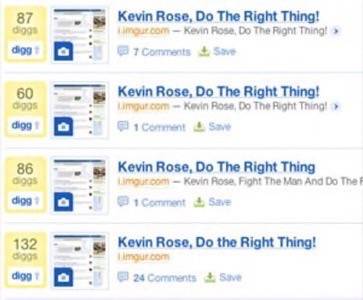The Internet was in flames last week as popular social news curation site Digg.com launched the latest iteration of its platform, unleashing a groundswell of outrage and protest from a majority of the site’s loyal users. A week later, Digg has begun to respond to its passionate community, making rapid changes and bug fixes as its exhausted back-end infrastructure struggles to keep up. Today I spoke with Digg’s VP of Product Keval Desai about the launch, the company’s reaction to the negativity from its community and how it intends to move forward into the future.

“We recognize that the launch was not as smooth as we would have hoped,” Desai told ReadWriteWeb. Perhaps that is a bit of an understatement.
“We had a game plan and clearly it did not go smoothly. In hindsight, there are several things that could have been done better.”
– Keval Desai
Stumbling Off the Starting Blocks
For last Wednesday’s relaunch, Digg migrated all of its traffic over to an entirely new back-end infrastructure built from the ground up over the course of 18 months. The new system had been tested in beta for almost two months, but the preparations the site conducted for the public release apparently fell short of what was needed to handle last week’s traffic surge.
“Hindsight is 20/20. We made a calculated decision to test the site in beta and then launch,” Desai says. “We had a game plan and clearly it did not go smoothly. In hindsight, there are several things that could have been done better.”
A few of those “several things” include a slower roll-out and a better explanation of the site’s rationale, admits Desai. With many Internet sites, he explains, features are more continually released to the public, not all at once as was the case with Digg 4. Part of the reason for rewriting the back-end of the site was to allow for easier and more frequent product iterations – a practice Digg intends to implement in the future.
Turning Negative into Positive
As for the backlash from frustrated Digg users, Desai says the company is thankful for their passion.

“It’s better than having no reaction,” he says. “They have a right to say what they want to say, and for us it’s all good feedback. We would rather not have users be frustrated, that was not a goal of ours, but we are reacting to those frustrations and making changes where they make sense while keeping our broader mission in mind.”
Going Forward
That “broader mission,” Desai says, includes continuing to grow the platform to provide for publishers, both large and small, as well as its users that make the site what it is. Since launching v4, Digg has seen traffic at equal or higher numbers each day, and the My News section has helped send registration numbers through the roof.
But as Desai admits, “it is still early going,” and if Digg wants to continue to leverage its recent growth, it will need to more carefully and more stably iterate its product in the future.

















